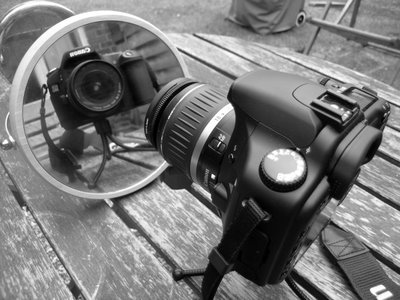A Camera Looks At Itself

An interview with the artist:
NSB: This is at once a deeply insightful and positively dull piece. What was your inspiration?
AA: I’m interested in how society perceives itself and how it’s perceived by others. I wanted to make a statement about how I perceive society perceives itself.
NSB: So it’s not just a camera looking at itself.
AA: The camera’s a metaphor for how modern society views itself, which is largely through the mass media. In this sense, the camera objectifies those aspects of society that we most like to see: celebrity, success, marketing. Ironically, the camera looks, but it can’t see.
NSB: Why not?
AA: Because the shutter’s closed.
NSB: I see. So you’re saying that society lacks introspection.
AA: To the extent that another viewpoint on society is required, hence the view of a camera looking at itself from a different camera’s perspective.
NSB: Ah, it’s all coming into focus now (no pun intended). The medium you choose for your works has always had a great deal of significance. Here you’ve chosen digital photography, and there are rumours that you’ve expressly prohibited any print reproductions of the work. Why?
AA: I felt that a digital medium was a particularly apt format for this subject. There’s the obvious visual pun of a digital camera being itself digitized, but there are other reasons. The digital revolution has made the average individual into a photographer. People who perhaps would have no eye for composition, lighting and depth of field can now create photographs in seconds at minimal cost that would previously have required a certain amount of skill, time, dedication and money to produce, and the ability to enhance digital photographs on a personal computer gives the average Joe almost limitless options. Digital photography is a flattering, but fickle technology: whatever’s sub-optimal, you can enhance, and whatever you don’t like, you can discard. In this sense, it’s an interesting reflection (excuse the pun) on modern society and, indeed, modern celebrity.
NSB: So the medium is itself ironic. Irony seems to be permeate your work. How did you become so cynical?
AA: Certainly, I like to express ironies in my work, but I don’t think it can be considered cynical. Ironies occur because of inconsistencies, sometimes irreconcileable inconsistencies, in logic or value systems. Whether you consider those cynical or not depends upon how you interpret them.
NSB: And you’re not worried that your work will be erased from the hard-drive? How can it be art if it’s been deleted?
AA: I don’t think it ceases to be art just because you can’t see it. The art is in the statement. How you interact with it is a different matter. Although for some the public’s reaction to a statement is in itself considered art.
NSB: So the Guernika would be art even if it hadn’t been painted?
AA: The Guernika is art insofar as those brushstrokes were made into a statement somewhere at some time. Whether you can see the painting or not is irrelevant. Most people haven’t actually seen the Guernika.
NSB: Yes, but we at least know that it exists.
AA: Does something stop being art just because nobody knows it exists?
NSB: So if I destroyed the Guernika, it would still be art? But where would it be displayed? Who would go to see it? By that criterion, anyone could be creating art at any time. Nobody would know about it. We could all be artists.
AA: Perhaps.
NSB: So, in fact, there’s no way for us to know whether your work is really art or whether it’s just as fickle as society and digital photography. I could just delete it and there would be none the wiser.
AA: Go ahead. Delete it.
NSB: But… I can’t.
AA: Why not?
NSB: Because… it’s art...
AA: Exactly.

0 Comments:
Post a Comment
<< Home